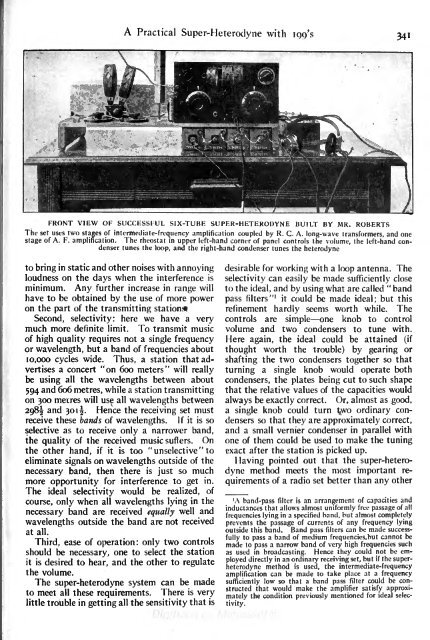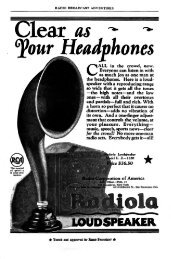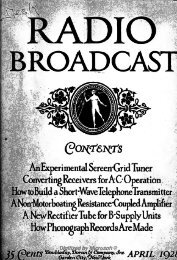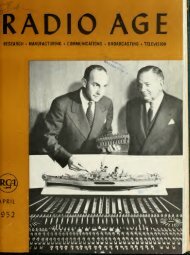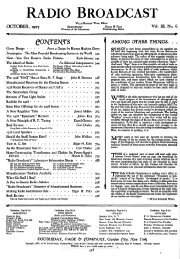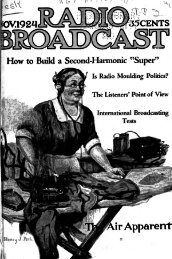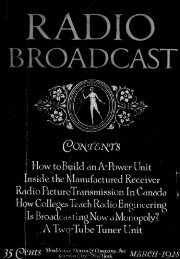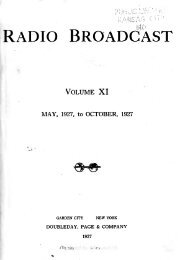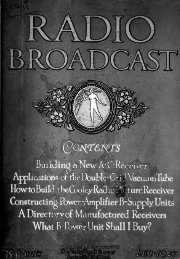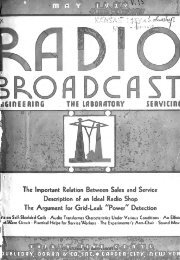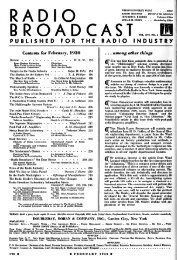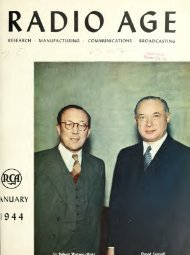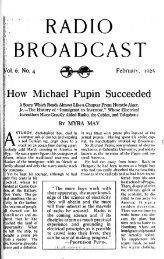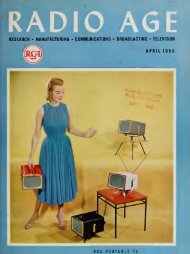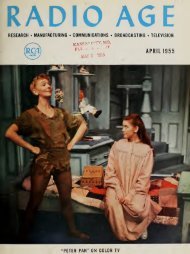Radio Broadcast - 1923, August - 86 Pages, 8.5 ... - VacuumTubeEra
Radio Broadcast - 1923, August - 86 Pages, 8.5 ... - VacuumTubeEra
Radio Broadcast - 1923, August - 86 Pages, 8.5 ... - VacuumTubeEra
- No tags were found...
Create successful ePaper yourself
Turn your PDF publications into a flip-book with our unique Google optimized e-Paper software.
A PracticalSuper-Heterodyne with341FRONT VIEW OF SUCCESSFUL SIX-TUBE SUPER-HETERODYNE BUILT BY MR. ROBERTSThe set uses two stages of intermediate-frequency amplification coupled by R. C. A. long-wave transformers, and onestage of A. F. amplification. The rheostat in upper left-hand corner of panel controls the volume, the left-hand condensertunes the loop, and the right-hand condenser tunes the heterodyneto bring in static and other noises with annoying desirable for working with a loop antenna. Theloudness on the days when the interference is selectivity can easily be made sufficiently closeminimum. Any further increase in range will to the ideal, and by using what are called " bandhave to be obtained by the use of more power pass filters" 1 it could be made ideal; but thison the part of the transmitting station*refinement hardly seems worth while. TheSecond, selectivity: here we have a very controls are simple one knob to controlmuch more definite limit. To transmit music volume and two condensers to tune with.of high quality requires not a single frequency Here again, the ideal could be attained (ifor wavelength, but a band of frequencies about thought worth the trouble) by gearing or10,000 cycles wide. Thus, a station that advertisesa concert "on 600 meters" will really turning a single knob would operate bothshafting the two condensers together so thatbe usingall the wavelengths between about condensers, the plates being cut to such shape594 and 606 metres, while a station transmitting that the relative values of the capacities wouldon 300 metres will use allwavelengths between always be exactly correct. Or, almost as good,298^ and 30 1 \. Hence the receiving set must a single knob could turn tyvo ordinary condensersso that they are approximately correct,receive these bands of wavelengths.If it is soselective as to receive only a narrower band, and a small vernier condenser in parallel withthe quality of the received music suffers. On one of them could be used to make the tuningthe other hand, if it is too "unselective" to exact after the station ispicked up.eliminate signals on wavelengths outside of the Having pointed out that the super-heterodynemethod meets the most important re-necessary band, then there is just so muchmore opportunity for interference to get in. quirements of a radio set better than any otherThe ideal selectivity would be realized, ofcourse, only when all wavelengths lying in the 'A band-pass filter is an arrangement of capacities andinductances that allows almostnecessary band are received equally well anduniformly free passage of allfrequencies lyingwavelengths outside the band in a specified band, but almost completelyare not received prevents the passage of currents of any frequency lyingat outside this band. Bandall.pass filters can be made successfullyThird, ease of operation: only two controlsto pass a band of medium frequencies, but cannot bemade to pass a narrow band of very high frequencies suchshould be necessary, one to select the station as used in broadcasting. Hence they could not be employeddirectly regulatein an ordinary receiving set, but if the super-it is desired to hear, and the other toheterodyne method is used, the intermediate-frequencythe volume.amplification can be made to take place at a frequencyThe super-heterodyne system can be made sufficiently low so that a band pass filter could be constructedthat would make the amplifier satisfy approximatelythe condition previously mentioned for ideal selec-to meet all these requirements. There is verylittle trouble in getting all the sensitivity that istivity.


